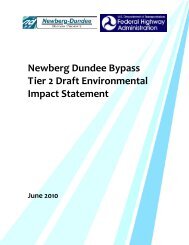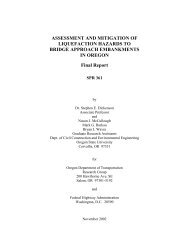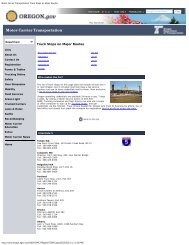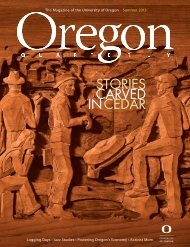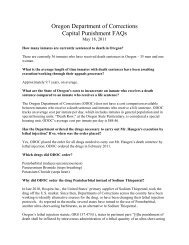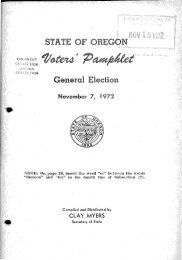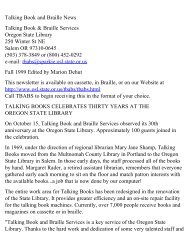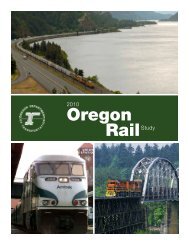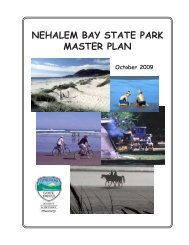Oregon Balance of State HIV/AIDS Housing & Services Systems ...
Oregon Balance of State HIV/AIDS Housing & Services Systems ...
Oregon Balance of State HIV/AIDS Housing & Services Systems ...
You also want an ePaper? Increase the reach of your titles
YUMPU automatically turns print PDFs into web optimized ePapers that Google loves.
<strong>Oregon</strong> <strong>HIV</strong>/<strong>AIDS</strong> <strong>Housing</strong> and <strong>Services</strong> <strong>Systems</strong> Integration Plan 23<br />
programs, which have been used extensively in <strong>Oregon</strong> since the inception <strong>of</strong> the HOME<br />
program. 59 HOME TBA is designed to be transitional, with the housing subsidy expiring after 24<br />
months, during which time the tenant works toward a personal self-sufficiency plan.<br />
While HOME TBA administrators can include program preferences for people with <strong>HIV</strong>/<strong>AIDS</strong> or<br />
other special needs, in order to maintain successful self-sufficiency programs, they must select<br />
clients that are likely to resolve financial issues and increase their income by the end <strong>of</strong> the subsidy<br />
period. 60 For example, ACCESS Inc. in Jackson County created a secondary preference for people<br />
living with <strong>HIV</strong>/<strong>AIDS</strong> in their HOME TBA self-sufficiency program, but reported some negative<br />
experiences after receiving referrals <strong>of</strong> clients who were probably better suited for long-term<br />
housing assistance. ACCESS and the OHOP Region 3 <strong>Housing</strong> Coordinator plan to work together<br />
to ensure the careful use <strong>of</strong> that preference for appropriate clients with <strong>HIV</strong>/<strong>AIDS</strong>.<br />
One new affordable housing development opportunity that <strong>HIV</strong>/<strong>AIDS</strong> housing and services<br />
stakeholders may access through the CFC is the <strong>Housing</strong> PLUS (Permanent Living Utilizing<br />
<strong>Services</strong>) program, which will help finance permanent supportive housing for formerly homeless<br />
people. The program includes $16 million that will leverage additional funding to create 150 units.<br />
The first $4 million will be awarded by OHCS through the Spring 2008 CFC. Stakeholders across<br />
the state, including housing authorities and nonpr<strong>of</strong>it developers, have expressed interest in<br />
pursuing this new funding source. By <strong>of</strong>fering the leverage <strong>of</strong> support services and/or rental<br />
subsidy, the OHOP program may be able to partner with an affordable housing developer to make<br />
units available for formerly homeless people living with <strong>HIV</strong>/<strong>AIDS</strong>, as described below in the<br />
“Recommendations” section. For more information on this particular program, please refer to the<br />
contacts listed in Appendix 1: Affordable <strong>Housing</strong> Resource Guide.<br />
Local CDBG and HOME Funds<br />
Seven cities in the balance <strong>of</strong> state receive CDBG and/or HOME allocations and are required to<br />
prepare their own Con Plans: Ashland, Bend, Eugene, Corvallis, Medford, Salem, and Springfield<br />
(Eugene and Springfield submit a combined Con Plan).<br />
Most <strong>of</strong> these city Con Plans do not directly address the housing needs <strong>of</strong> people living with<br />
<strong>HIV</strong>/<strong>AIDS</strong>. Both the City <strong>of</strong> Bend and the City <strong>of</strong> Medford Con Plans describe persons living with<br />
<strong>HIV</strong>/<strong>AIDS</strong> as a “Low” priority among special needs populations. 61<br />
Table 6 on the following page summarizes the <strong>Oregon</strong> formula allocations for the CDBG and<br />
HOME programs for Fiscal Year 2007.<br />
59 “<strong>State</strong>s, HOME, and Tenant-Based Assistance,” Council <strong>of</strong> <strong>State</strong> Community Development Agencies, 1997. Available online:<br />
http://www.coscda.org/publications/TBA.htm (Accessed: November 30, 2007).<br />
60 Ibid.<br />
61 City <strong>of</strong> Bend. Consolidated Plan 2004-2009. Available online:<br />
http://www.ci.bend.or.us/depts/urban_renewal_economic_development/ (Accessed: November 28, 2007); and City <strong>of</strong> Medford.<br />
Consolidated Plan 2005-2009. Available online: http://www.ci.medford.or.us/Page.asp?NavID=632 (Accessed: November 28, 2007).



